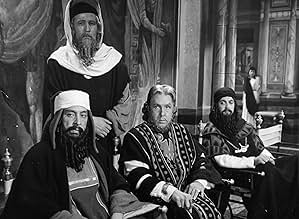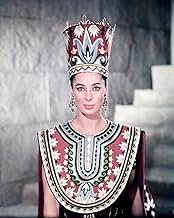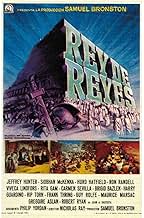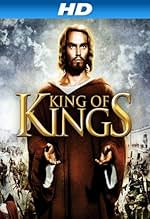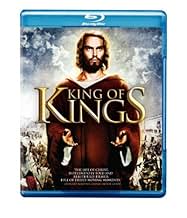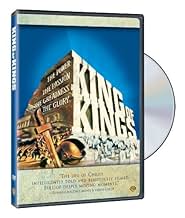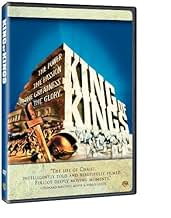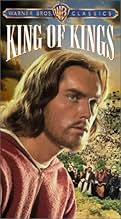NOTE IMDb
7,0/10
9,6 k
MA NOTE
La vie physique temporaire du sauveur biblique, Jésus Christ.La vie physique temporaire du sauveur biblique, Jésus Christ.La vie physique temporaire du sauveur biblique, Jésus Christ.
- Réalisation
- Scénario
- Casting principal
- Récompenses
- 2 victoires et 1 nomination au total
Grégoire Aslan
- Herod
- (as Gregoire Aslan)
Avis à la une
Everything fits together as soon as the film opens with Orson Welles' narrating the story of the Son of God. Little Jesus grows up to be the very American and impossibly blue-eyed Jeffrey Hunter (his opening scene with Robert Ryan's Baptist is superb), who goes on to cure the lame, the insane, the blind, rehabilitate Mary Magdelene, and all the usual things. Hunter is very good in the role, which may have been surprising at the time given his previous form in Westerns (and later in Star Trek's pilot episode!). Other good points - Hurd 'Dorian Gray' Hatfield as Pilate, the dance of the seven veils, the ending, the glorious score ...
It fits together better than The Greatest Story Ever Told, which got too starry and was spoiled by John Wayne's son of gawd. Here everyone knows their place and the religious context remains unscathed by the whitewash of Hollywood. Excellent.
It fits together better than The Greatest Story Ever Told, which got too starry and was spoiled by John Wayne's son of gawd. Here everyone knows their place and the religious context remains unscathed by the whitewash of Hollywood. Excellent.
MGM must be credited with bankrolling this expensive project. True, their objectives were probably mercenary, hoping to cash in on their earlier commercial success, "Ben Hur." Still, the big studio can't be faulted for choosing Nicholas Ray to head their massive enterprise. Ray's work's always worth watching, and here he proves he can lead a gigantic spectacle to impressive heights.
Miklos Rozsa's "inspirational" score is notable for its prominent use of voices and thematic motifs. Philip Yordan and his writing colleagues fashion a respectable script.
Orson Welles manages to subdue his often florid histrionic tendencies to render outstanding narration.
Further credit to MGM for engaging a more than decent cast of solid professionals, headed by Siobhan McKenna, Hurd Hatfield, Viveca Lindfors, Rip Torn and Robert Ryan.
Kudos to the second unit and art direction, and to the fine photography and striking costumes.
Jeffery Hunter must be given credit for taking on an impossible role and coming out not too badly.
As for the validity of its historicity, that may be an entirely different matter, and each viewer must draw his and her own conclusions on this. With a story as old as the hills, there isn't much room left for many fresh insights, and what gives this interest is the big studio that mounts this ancient tale.
In this case, MGM and crew made a pretty good show.
Miklos Rozsa's "inspirational" score is notable for its prominent use of voices and thematic motifs. Philip Yordan and his writing colleagues fashion a respectable script.
Orson Welles manages to subdue his often florid histrionic tendencies to render outstanding narration.
Further credit to MGM for engaging a more than decent cast of solid professionals, headed by Siobhan McKenna, Hurd Hatfield, Viveca Lindfors, Rip Torn and Robert Ryan.
Kudos to the second unit and art direction, and to the fine photography and striking costumes.
Jeffery Hunter must be given credit for taking on an impossible role and coming out not too badly.
As for the validity of its historicity, that may be an entirely different matter, and each viewer must draw his and her own conclusions on this. With a story as old as the hills, there isn't much room left for many fresh insights, and what gives this interest is the big studio that mounts this ancient tale.
In this case, MGM and crew made a pretty good show.
The story of Jesus has been told many times from the very beginning of the movies, but this version, underrated when first released, is one of the best.
KING OF KINGS creates and sustains a dignified yet highly entertaining tone that is unique among biblical epics. The screenplay is extremely intelligent and effective, concentrating not just on Jesus, but on the society and personalities that surround him. Pilate, Caiaphas, Mary, John the Baptist, Mary Magdalene, the apostles, and a sublimely oversexed Salome are all well-drawn characters and well-cast, especially in contrast to the uncomfortable "superstar cameo" approach George Stevens used in his inferior "Greatest Story Ever Told".
The political background is well handled, making clear the wish of Judas and others that Jesus foment a revolution to free the Jews from Roman rule.
Handsome, myopic Jeffrey Hunter may not be a great actor, but his low-key, measured performance matches the overall design of the film very well. Orson Welles' rapt, mellifluous narration is a plus, as is Roschka's passionate musical score.
Definitely see this letter-boxed to appreciate the gorgeous scenery, photography, and spectacular scenes.
KING OF KINGS creates and sustains a dignified yet highly entertaining tone that is unique among biblical epics. The screenplay is extremely intelligent and effective, concentrating not just on Jesus, but on the society and personalities that surround him. Pilate, Caiaphas, Mary, John the Baptist, Mary Magdalene, the apostles, and a sublimely oversexed Salome are all well-drawn characters and well-cast, especially in contrast to the uncomfortable "superstar cameo" approach George Stevens used in his inferior "Greatest Story Ever Told".
The political background is well handled, making clear the wish of Judas and others that Jesus foment a revolution to free the Jews from Roman rule.
Handsome, myopic Jeffrey Hunter may not be a great actor, but his low-key, measured performance matches the overall design of the film very well. Orson Welles' rapt, mellifluous narration is a plus, as is Roschka's passionate musical score.
Definitely see this letter-boxed to appreciate the gorgeous scenery, photography, and spectacular scenes.
For me and, I suspect, a lot of other Boomers who were pious as kids and tipped off by nuns about the 4:30 Movie on Good Friday, this one is beyond criticism. When it's time for us to go, many of us will be seeing Hunter's face, baby blues and all, in the midst of the white light... But personal soft spots aside, it's a pretty good Jesus picture. Hunter may speak with the unctious blandness of a TV game show host, but he's earnest and vigorous and has a certain charisma you could take as Godhood... The music is sublime. Ray's direction has a lot of the REBEL WITHOUT quirks. Note the weird angles during Salome's dance. The Sermon on the Mount is probably the best sequence. Those oddly lit and artsily angled close-ups of Jesus are intriguing. Then He comes over the hill with His arms outstretched and it's pure glory... Sweet as a jelly bean, redolent of Easter lilies.
A few years earlier than George Stevens mammoth all star film about the life of Jesus was this film by Nicholas Ray. Taking, it's title from the Cecil B. DeMille silent film, this version of King of Kings is in no way a remake of the DeMille epic. This King of Kings is a moving reverential account of the life of the obscure carpenter from Galilee whose thoughts still move millions today. The voice you hear doing the narration bridging of the various episodes of Jesus's life is the familiar one of Orson Welles.
Nicholas Ray shot this film in Spain with the broad central plain serving as Judea in the early years of AD. Unlike Stevens, Nicholas Ray used second line players for the most part, the biggest name in the cast is that of Robert Ryan as John the Baptist.
Jesus is played by Jeffrey Hunter and if you were to ask today's movie fans what they most remember about Hunter, they will either say his role in the original Star Trek pilot as Captain Christopher Pike, or his two roles in John Ford films, The Searchers and Sergeant Rutledge. Some reviewers have remarked about Hunter's blue eyes, personally I think Nicholas Ray might have cast Hunter with those baby blues to mark Jesus as indeed unique among the populace of Judea. In any event it's a sincere portrayal that Hunter gives. He's most effective in the Sermon on the Mount scene.
King of Kings takes a great deal more liberties with the four Gospels than does the Greatest Story Ever Told. It fleshes out the peripheral characters in the Bible giving them more identity than Scripture does. Barabbas as played by Harry Guardino is a guerrilla leader rather than a bandit and Rip Torn who is Judas is one of his associates who leaves Barabbas after the Sermon on the Mount.
Judas's motives for betrayal are explained as an effort to force Jesus's hand. He wants Jesus to use his power of miracles to aid in the freedom fight against Rome. I think most people view Judas as doing what he did because he totally failed to understand the mission and nature of who he was following, What Ray does here is deepen that context.
There are a few scenes in their besides this part of the storyline that are not biblically found. After Jesus saves Mary Magdalene, Carmen Sevilla as Mary goes searching for him and visits with Mary his mother who is played by Siobhan McKenna. They talk for a bit, McKenna describes some of the miracles attributed to her son.
Jesus himself drops out of biblical dialog in a scene where he asks to visit John the Baptist. The scene is with the Centurion Lucius who was present at the massacre in Bethlehem and later would pronounce His epitaph at the cross. Ron Randell plays Lucius and his Lucius is a world weary professional soldier, sickened by the court of Herod the Great and his successor Herod Antipas. He hates having to serve these people because Rome is backing them as surrogate leaders. Randell has a key role here, he serves as a prototype for the gentiles who Jesus says his disciples must minister to.
Being inveterate star gazer I am, I do like The Greatest Story Ever Told better. But King of Kings is still a fine retelling of that selfsame story.
Nicholas Ray shot this film in Spain with the broad central plain serving as Judea in the early years of AD. Unlike Stevens, Nicholas Ray used second line players for the most part, the biggest name in the cast is that of Robert Ryan as John the Baptist.
Jesus is played by Jeffrey Hunter and if you were to ask today's movie fans what they most remember about Hunter, they will either say his role in the original Star Trek pilot as Captain Christopher Pike, or his two roles in John Ford films, The Searchers and Sergeant Rutledge. Some reviewers have remarked about Hunter's blue eyes, personally I think Nicholas Ray might have cast Hunter with those baby blues to mark Jesus as indeed unique among the populace of Judea. In any event it's a sincere portrayal that Hunter gives. He's most effective in the Sermon on the Mount scene.
King of Kings takes a great deal more liberties with the four Gospels than does the Greatest Story Ever Told. It fleshes out the peripheral characters in the Bible giving them more identity than Scripture does. Barabbas as played by Harry Guardino is a guerrilla leader rather than a bandit and Rip Torn who is Judas is one of his associates who leaves Barabbas after the Sermon on the Mount.
Judas's motives for betrayal are explained as an effort to force Jesus's hand. He wants Jesus to use his power of miracles to aid in the freedom fight against Rome. I think most people view Judas as doing what he did because he totally failed to understand the mission and nature of who he was following, What Ray does here is deepen that context.
There are a few scenes in their besides this part of the storyline that are not biblically found. After Jesus saves Mary Magdalene, Carmen Sevilla as Mary goes searching for him and visits with Mary his mother who is played by Siobhan McKenna. They talk for a bit, McKenna describes some of the miracles attributed to her son.
Jesus himself drops out of biblical dialog in a scene where he asks to visit John the Baptist. The scene is with the Centurion Lucius who was present at the massacre in Bethlehem and later would pronounce His epitaph at the cross. Ron Randell plays Lucius and his Lucius is a world weary professional soldier, sickened by the court of Herod the Great and his successor Herod Antipas. He hates having to serve these people because Rome is backing them as surrogate leaders. Randell has a key role here, he serves as a prototype for the gentiles who Jesus says his disciples must minister to.
Being inveterate star gazer I am, I do like The Greatest Story Ever Told better. But King of Kings is still a fine retelling of that selfsame story.
Le saviez-vous
- AnecdotesJeffrey Hunter and Robert Ryan's car broke down on the way to the "Sermon on the Mount" scene. In costume as Jesus Christ and John the Baptist, they had to push the car to get it started.
- GaffesNear the end of the temptation of Christ by Satan scene, 2 power line poles can clearly be seen in 2 shots, in the upper right rear of a long shot of the desert and canyons.
- Citations
[Jesus is mending a chair for the Virgin Mary, but has to leave for Jerusalem]
Jesus: The chair will have to wait until I return.
Virgin Mary: [having a vague premonition of Jesus' arrest, trial and death] The chair will never be mended. I am going with you.
- ConnexionsFeatured in Manille (1975)
Meilleurs choix
Connectez-vous pour évaluer et suivre la liste de favoris afin de recevoir des recommandations personnalisées
- How long is King of Kings?Alimenté par Alexa
Détails
Box-office
- Budget
- 5 037 000 $US (estimé)
- Durée2 heures 48 minutes
- Couleur
- Rapport de forme
- 2.20 : 1
Contribuer à cette page
Suggérer une modification ou ajouter du contenu manquant

Lacune principale
By what name was Le roi des rois (1961) officially released in India in English?
Répondre


